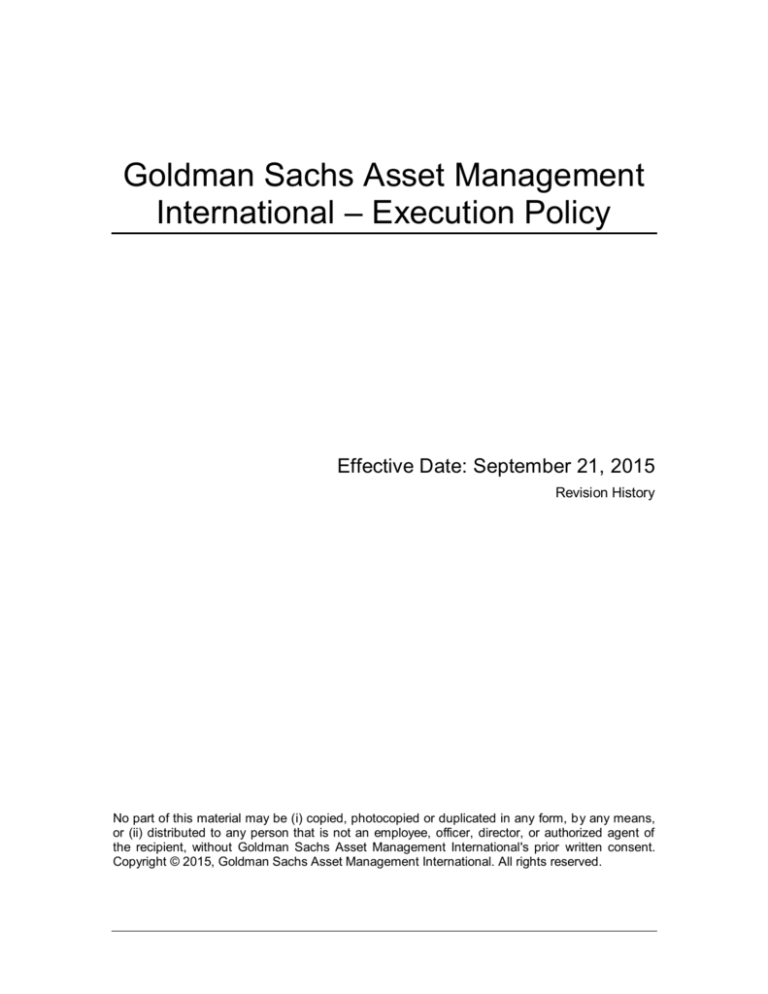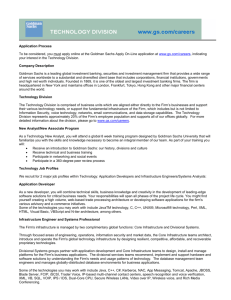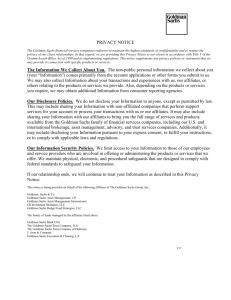
Goldman Sachs Asset Management
International – Execution Policy
Effective Date: September 21, 2015
Revision History
No part of this material may be (i) copied, photocopied or duplicated in any form, by any means,
or (ii) distributed to any person that is not an employee, officer, director, or authorized agent of
the recipient, without Goldman Sachs Asset Management International's prior written consent.
Copyright © 2015, Goldman Sachs Asset Management International. All rights reserved.
Goldman Sachs Asset Management International – Execution Policy
Table of Contents
I. OVERVIEW .................................................................................................................................................
II. THE ORDER PROCESS ...........................................................................................................................
A. ORDER MANAGEMENT ...............................................................................................................................
B. RECORD KEEPING ......................................................................................................................................
III. EXECUTION POLICIES ........................................................................................................................
1. Selection of execution venues and brokers ......................................................................................
2. Execution venue and broker approval process .................................................................................
3. Monitoring of approved execution venues and brokers ...................................................................
A. E XECUTION POLICY: EQUITY ....................................................................................................................
B. EXECUTION POLICY: FIXED INCOME ..........................................................................................................
C. EXECUTION POLICY: LIQUIDITY MANGEMENT ...........................................................................................
D. EXECUTION POLICY: CURRENCY ...............................................................................................................
IV. BEST POSSIBLE RESULT MONITORING .........................................................................................
A. MONITORING .............................................................................................................................................
1. Equity ...............................................................................................................................................
2. Fixed Income....................................................................................................................................
3. Liquidity Management .....................................................................................................................
4. Currency ...........................................................................................................................................
B. PROHIBITED PRACTICES .............................................................................................................................
V. REVIEW OF GSAMI'S EXECUTION POLICY ....................................................................................
GLOSSARY OF TERMS ...............................................................................................................................
ANNEX A .........................................................................................................................................................
Revision History
September 21, 2015
August 5, 2014
January 24, 2014
September 2, 2013
May 22, 2012
November 7, 2008
Goldman Sachs Asset Management International – Execution Policy
I. OVERVIEW
This document explains Goldman Sachs Asset Management International's
(GSAMI's) execution policy in accordance with the regulatory requirements set
out in Chapter 11 of the Financial Conduct Authority's (FCA) Conduct of
Business Sourcebook (COBS 11). Pursuant to these rules, GSAMI must, when
providing the service of portfolio management, comply with the obligation to act
in accordance with the best interests of its clients when placing orders with other
entities for execution that result from decisions by GSAMI to deal in financial
instruments on behalf of its clients.
As of the date of this policy, all of GSAMI's clients are categorized as
Professional Clients and the policy addresses GSAMI's obligations in respect of
this category of clients.
This policy summarises GSAMI's process for taking all reasonable steps when
carrying out client order executions to obtain the best possible result for its
clients, including the following information:
GSAMI's approach to client order execution;
the execution venues and brokers that GSAMI generally intends to use to
enable it to obtain on a consistent basis the best possible result for the
execution of client orders;
the critical factors affecting the approach to client order execution and the
weighting methods applied to such factors; and
an explanation of the procedures adopted by GSAMI to monitor its execution
arrangements and this execution policy.
GSAMI directly manages client assets across multiple asset classes and the
following of these (and specific desks, where relevant) are, at the date of this
policy, covered by this policy: Equity, Fixed Income, Liquidity Management, and
Currency.1 The aim of this policy is to set out GSAMI's approach to client orders
on a general basis and in respect of each asset class.
In certain circumstances, GSAMI may delegate all or part of the discretionary
management of a client portfolio (including delegation to GSAMI's affiliates).
Where GSAMI delegates discretionary management of a client portfolio to an
affiliate or a non-affiliate it will ensure that such delegation is permitted in its
contractual arrangements with the client. Any such delegate may be subject to
the rules of a regulator in the jurisdiction of the delegate (including a jurisdiction
outside the European Economic Area (EEA)) and not be subject to the FCA
Rules and may not be required to maintain an order execution policy. In such
circumstances, GSAMI is still required to ensure that the service provided to its
client is performed in accordance with the best interests of the client, and GSAMI
shall take all reasonable steps to ensure that its selection of the delegate and the
1
This policy applies to all groups within GSAMI, including Advanced Investment Strategies and
Goldman Sachs Investment Partners. Trading in derivative instruments related to equity, fixed
income, liquidity management and currency is addressed within the provisions in this policy
applying to Equity, Fixed Income, Liquidity Management and Currency, respectively.
September 21, 2015
2
Goldman Sachs Asset Management International – Execution Policy
overall management of the portfolio continue to meet this obligation. Further,
GSAMI shall ensure that any such delegation shall be governed by the terms of a
service provider agreement between GSAMI and the delegate, by virtue of which
the delegate will be responsible to GSAMI for the performance of its obligations.
II. THE ORDER PROCESS
The GSAMI execution process encompasses steps from the order decision to the
final settlement to facilitate competitive performance and represents a strategy
designed to obtain the best possible result for the client.
This policy applies to GSAMI client orders where GSAMI either: (i) executes
client orders; or (ii) places client orders with other entities for execution that result
from decisions by GSAMI to deal.
In providing discretionary investment management services, GSAMI places client
orders with a wide variety of execution venues and brokers, both affiliates (where
permitted by regulation and client mandates) and non-affiliates, and whether
domiciled in the EEA or not.
A. Order management
When managing client orders, GSAMI must take all reasonable steps to obtain
the best possible execution result for its clients, having regard to the execution
policies described below. This typically involves the aggregation of orders of
different clients. Where orders are aggregated this will occur in accordance with
the relevant FCA Rules and records will be maintained as required by those
Rules.
The executed orders are allocated to clients fairly and proportionately in
accordance with GSAMI's Trade Aggregation and Allocation policy.
B. Record keeping
GSAMI stores the records of its trading activity for a minimum of five years in
accordance with FCA Rules.
III. EXECUTION POLICIES
When taking all reasonable steps to obtain the best possible results for its clients,
GSAMI applies different execution methodologies depending on the relevant
asset class. This section describes the policies and factors considered generally
and for each asset class specifically. The overall driver for GSAMI in the
individual asset class execution policies is to obtain the best possible result for
the client on a consistent basis.
1. Selection of execution venues and brokers
Under MiFID, the generic term "execution venue" is used to describe:
Systematic Internalisers (principal traders and market makers);
Multilateral Trading Facilities (MTFs);
September 21, 2015
3
Goldman Sachs Asset Management International – Execution Policy
Regulated Markets; or
Counterparties acting as liquidity providers (including affiliates dealing as
principal) (e.g., a counterparty willing to purchase a security held by a GSAMI
client).
Please refer to Annex A for a list of execution venues and brokers used by
GSAMI.
In the case where a client gives a specific instruction to GSAMI (a situation that
should be relatively rare given GSAMI's primary role as a discretionary asset
manager) this policy will not be applied for those aspects of the execution relating
to the specific instruction.
Subject to any specific instructions that GSAMI accepts from clients, GSAMI
takes into account a range of factors in deciding how to execute client orders,
including, but not limited to, price; costs; timing and speed of execution;
responsiveness; creditworthiness and financial stability; likelihood of, and
capabilities in, execution, clearance and settlement; size; liquidity in or with an
execution venue; nature; in certain circumstances, a broker's willingness to
commit capital; and other appropriate factors. Best price, giving effect to
commissions and commission equivalents (if any) and other transaction costs, is
normally an important factor in deciding how to execute transactions, but, in
consideration of the relevant factors, transactions will not always be executed at
the lowest available price or commission or commission equivalents (if any). In
determining the relative importance of factors considered, GSAMI takes into
account its clients' status as Professional Clients, together with the nature of
client orders, the characteristics of the financial instruments to which the order
relates and the characteristics of the available execution venues or brokers which
can be used or to which client orders can be directed. In addition, although
different execution strategies are used on a trade-by-trade basis (dependent on
factors such as market conditions, liquidity, investment strategy and client
guidelines), the weighting of factors often will be determined by investment
objectives for the strategy, the type of product to be traded, the rationale for the
trade (e.g., cash flow or change in analyst view) and other appropriate
considerations.
When applicable, GSAMI seeks to mitigate counterparty credit risk by transacting
with counterparties included on GSAMI's list of approved execution venues and
brokers (Approved List). For example, dealing in over-the-counter (OTC)
derivatives will be limited to counterparties on the Approved List with whom ISDA
Master Agreements and other appropriate or necessary agreements are in place.
This includes agreements to facilitate settlement for certain centrally cleared
derivatives contracts, and in such cases the perceived operational efficiency of
such counterparties will be relevant.
Further information for specific asset classes is set out below.
2. Execution venue and broker approval process
GSAMI has a process for the selection of execution venues and brokers, with
whom it executes client orders, and brokers, with whom it places client orders for
execution. The specific qualitative criteria to add an execution venue or broker to
the Approved List varies based on the asset class to be traded with or through
September 21, 2015
4
Goldman Sachs Asset Management International – Execution Policy
the venue or broker, but the overall approval process is in principle applied in the
same manner across all asset classes.
Each desk has procedures for adding a new broker and these are also screened
by the Anti-Money Laundering Suspicious Activities Group (AML Suspicious
Activities Group). Goldman Sachs' Credit Risk Management and Advisory Group
(CRMA) is required to conduct a credit analysis of, and approve, counterparties
or brokers to be involved in certain types of transactions in which GSAMI has
determined that credit risk monitoring is appropriate.
The criteria to add a counterparty or broker to the Approved List is generally
based on evaluation of a number of quantitative and qualitative factors that may
include (as applicable), but are not limited to, GSAMI's perception of the
counterparty's or broker's anticipated:
competitiveness of commission rates or spreads;
promptness of execution;
clearance and settlement capabilities;
provision of delegated regulatory reporting;
quality of service;
willingness to commit capital;
reputation
creditworthiness; and
access to markets
3. Monitoring of approved execution venues and brokers
All execution venues and brokers undergo ongoing negative media and
sanctions screening, the results of which will first be reviewed by the AML
Suspicious Activities Group. The AML Suspicious Activities Group will notify
Investment Management Division (IMD) Risk Management, GSAMI Compliance
and/or GSAMI Operations, as appropriate, when relevant risk information is
identified in the negative media and sanctions screening process (which may
include disciplinary actions, criminal proceedings or reputational issues), and the
AML Suspicious Activities Group, in conjunction with IMD Risk Management
and/or GSAMI Compliance, as appropriate, will determine appropriate steps to
manage any potential risk, including possible removal from the Approved List and
termination of the trading relationship. For execution venues and brokers which
required CRMA review and approval to be added to the Approved List, CRMA
conducts an ongoing credit analysis.
The Best Execution Committee (BEC),2 IMD Risk Management and GSAMI
Compliance all participate in a process designed to monitor execution quality,
including, directly and indirectly, review of the execution venues and brokers
used in trading. The process varies by asset type and instrument type within
asset type based on, among other considerations, reasonably available relevant
information used to monitor execution and competing venues or brokers and the
2
The BEC has assigned duties and responsibilities and meets at least quarterly.
September 21, 2015
5
Goldman Sachs Asset Management International – Execution Policy
perceived benefits of potential monitoring activities. See Section IV (Best
Possible Result Monitoring) for further information on the steps GSAMI takes to
monitor the execution quality achieved by execution venues and brokers.
A. Execution policy: Equity
Equity transactions are generally passed by GSAMI to brokers which have
access to the relevant exchange for execution and which are believed to have
expertise and the required understanding of GSAMI's trading objectives; equity
transactions also may be executed on directly accessed markets and MTFs.
However, for some types of transactions GSAMI will execute transactions directly
with execution venues. For example client orders for OTC derivatives may be
executed with counterparties directly, subject to considerations described above.
Although different execution strategies are used on a trade-by-trade basis
(dependent on factors such as market conditions, liquidity, investment strategy
and client guidelines), the weighting of factors often will be determined by
investment objectives for the strategy, the type of product to be traded, the
rationale for the trade (e.g., cash flow or change in analyst view), the number of
securities involved, the percentage of average daily volume that the trade
represents, the available liquidity in a security at the time and other appropriate
considerations. See Subsection 1 (Selection of execution venues and brokers)
for further information on the general factors considered in the selection of
venues and brokers.
In the case of equity-related derivative transactions, the selection of execution
venues and brokers will depend on, among other considerations, the nature of
the transaction (i.e., exchange-traded or OTC equity derivatives), the size of the
transaction, the proposed terms of a negotiated OTC derivative instrument,
counterparty risk (including but not limited to credit risk) and perceived settlement
capabilities. See Subsection 1 (Selection of execution venues and brokers) for
further information on the general factors considered in the selection of execution
venues and brokers.
B. Execution policy: Fixed Income
Fixed income transactions are generally executed directly by GSAMI rather than
passed to brokers for execution with third parties. However, for some types of
transactions GSAMI will use brokers. For example, client orders for exchange
traded derivatives (ETDs) are generally passed to brokers which have access to
the relevant exchange.
Execution using online, auction-type venues
Because online, auction-type venues
(e.g., MarketAxess, Tradeweb,
"BWIC"/"OWIC"3 functions) are generally widely available for participation by
interested parties and provide the opportunity for simultaneous, competitive
bids/offers from such parties, these venues typically are the preferred venues in
which to effect fixed income transactions. In general, use of these venues
3
"Bids wanted in competition"/"Offers wanted in competition"
September 21, 2015
6
Goldman Sachs Asset Management International – Execution Policy
essentially performs the price discovery function 4 and seeks best price by
initiating competition among multiple independent third parties.
However, online, auction-type venues are not available for all types of fixed
income transactions and, even when available, may have limited utility. Such
venues are generally believed not to be appropriate for transactions above a
certain size because the exposure of trade data in the process of participation
may adversely affect the relevant market and inadvertently compromise the
ability to obtain the best price available in the transaction. What size transactions
are appropriate for which venues and which security types varies by security type
and prevailing market conditions.
Price discovery/evaluation
For transactions that are not executed using an online, auction-type venue, in
terms of establishing the best price for a particular order, GSAMI will use
reasonably available and relevant sources of price discovery, including, but not
limited to, market transaction prices (e.g., TRACE data) on the same or
comparable financial instruments; quotes for, or yields on, the same or a
comparable financial instrument; third party pricing vendor prices (viewed with
current day market color) and external or internal models.
When there are multiple potential counterparties for a transaction that can be
contacted without implicating concerns regarding adversely affecting the relevant
market and inadvertently compromising the ability to obtain the best price
available in the transaction, quotes generally should be obtained from more than
one counterparty as part of the price discovery process. In certain less liquid
markets, however, attempting to obtain multiple quotes could have a negative
impact on obtaining best execution. For certain transactions, there may be only
one potential counterparty (e.g., one counterparty that holds or has access to a
security to be purchased). Whether multiple quotes can or should be obtained
varies by security type, security to be traded, size of the transaction and
prevailing market conditions.
Although different execution strategies are used on a trade-by-trade basis
(dependent factors such as on market conditions, liquidity, investment strategy
and client guidelines), the weighting of factors often will be determined by
investment objectives for the strategy, the type of product to be traded, the
rationale for the trade (e.g., cash flow or change in analyst view), potential
counterparties owning a security to be purchased or seeking to purchase a
security to be sold, the number of securities involved, the available liquidity in a
security at the time and other appropriate considerations. See Subsection 1
(Selection of execution venues and brokers) for further information on the
general factors considered in the selection of venues and brokers. Where
GSAMI passes ETD orders to brokers for execution, brokers will be selected
from the Approved List based on the considerations discussed above.
4
"Price discovery" as used herein generally refers to the process of determining the appropriate
price of an asset in the marketplace through the interactions of buyers and sellers or other data
relevant to determining the appropriate price at which GSAMI should seek to buy or sell a
particular asset..
September 21, 2015
7
Goldman Sachs Asset Management International – Execution Policy
C. Execution policy: Liquidity Management
Liquidity management trading is similar, in applicable respects, to fixed income
trading, described above. Due to volumes in which GSAMI typically executes
liquidity management transactions, a single broker or counterparty may be
approached for a trade on the basis of the broker's or counterparty's suitability for
that transaction, depending on a particular execution strategy according to
factors prevailing at the time of the trade.
Money market instruments
Transactions in money market instruments typically are executed as described
above for other fixed income securities.
Key criteria in selecting an execution venue for money market transactions will
generally include, as applicable:
ability to source money market instruments for purchase;
ability to provide liquidity for sales of money market instruments;
speed of execution;
creditworthiness; and
ability to deal in very large volumes.
Funding transactions
Transactions under repurchase agreements and reverse repurchase agreements
are executed with funding counterparties and brokers. Generally, yield/interest
rate will be one of the most important execution factors.
Key criteria in selecting a counterparty or broker for funding transactions will
generally include, as applicable:
ability to agree to transaction terms, including yield/interest rate and
applicable margin/haircuts;
ability to provide stability in financing;
creditworthiness;
ability to deal in very large volumes; and
counterparty exposure limits.
D. Execution policy: Currency
Currency trading is similar, in applicable respects, to fixed income trading,
described above. Spot foreign currency exchange transactions and OTC
derivatives generally are executed directly with execution venues, except that
ETD are executed through brokers. Due to volumes in which GSAMI typically
executes currency transactions, a single broker or counterparty may be
approached for a trade on the basis of the broker's or counterparty's suitability for
that transaction, depending on a particular execution strategy according to
factors prevailing at the time of the trade.
September 21, 2015
8
Goldman Sachs Asset Management International – Execution Policy
The predominant factor is best price at the time of execution. Key criteria in
selecting an execution venue or broker for foreign currency exchange
transactions will generally include, as applicable:
speed of execution;
creditworthiness;
ability to deal in very large volumes; and
clearance and settlement capability for the currencies involved.
IV. BEST POSSIBLE RESULT MONITORING
A. Monitoring
GSAMI monitors the effectiveness of this policy in various ways. The BEC, IMD
Risk Management, GSAMI Compliance and the trading desks all participate in a
process designed to monitor execution quality. When market data is considered
reasonably available and relevant, it generally is used to monitor execution
quality for transactions on a quantitative basis.
For other transactions,
monitoring may be more qualitative and subjective. Key features of asset classspecific monitoring are outlined below.
Representatives from IMD Risk Management, GSAMI Compliance and the
relevant trading desks are involved in various activities relating to monitoring,
reviewing and reporting execution quality, including execution venues and
brokers used in trading. A summary of execution monitoring is provided quarterly
to the BEC.
GSAMI monitors its execution venues and brokers as described above in Section
III (Execution Policies—Monitoring of approved execution venues and brokers),
including monitoring any applicable counterparty exposure limits.
1. Equity
IMD Risk Management undertakes a quarterly quantitative review of equity
trading and execution quality and related matters, including a transaction cost
analysis of commissions and performance relative to market data. A summary is
provided quarterly to the BEC.
September 21, 2015
9
Goldman Sachs Asset Management International – Execution Policy
2. Fixed Income
GSAMI Compliance monitors transaction execution on an individual trade basis
using a combination of proprietary and third party (e.g., Tradeweb) reports to
evaluate trade execution with respect to certain fixed income security types,
where market data is reasonably available and believed to be relevant for
analysis. Where market execution prices are reasonably available and are used
in the monitoring process, GSAMI Compliance typically uses a tolerance range
for review and exception reporting. Each trading desk is required to supply
explanations for potential outliers relative to the applicable tolerance range or
other data.
Summaries of post-transaction monitoring (e.g., total number of trades covered
and total number and percentage of trades outside benchmark parameters) are
provided quarterly to the BEC.
IMD Risk Management conducts a semi-annual "broker vote" assessing
counterparties' execution services. The results are analyzed by representatives
of IMD Risk Management in light of actual counterparty usage over the relevant
period, and a summary is provided to the BEC.
3. Liquidity Management
The process used to monitor trading is similar, in applicable respects, as the
process used for fixed income trading, described above.
4. Currency
The process used to monitor trading is similar, in applicable respects, as the
process used for fixed income trading, described above.
B. Prohibited practices
With respect to the selection of execution venues and brokers, the following
practices are prohibited:
trades may not be directed in return for error corrections by a broker;
trades may not be directed in return for suggested preferential treatment in
security offerings or placements;
trades may not be directed in return for gifts and/or entertainment;
"directed brokerage" arrangements may not be entered into, other than clientdirected or client commission recapture arrangements, which must be
documented and approved by GSAMI Legal prior to the commencement of
the arrangement; and
trades may not be directed in return or recognition for client referrals
(separate accounts or sale of fund shares) or for "shelf space" in accordance
with Rule 12b-1(h) under the U.S. Investment Company Act of 1940; cash
payments in recognition of referrals are governed by Rule 206(4)-3 under the
U.S. Investment Advisers Act (see Cash/Payment for Client Solicitations
(Referral Fees)).
In addition, the following policies apply to minimise or eliminate conflicts.
September 21, 2015
10
Goldman Sachs Asset Management International – Execution Policy
V.
Portfolio managers and traders must take care not to be influenced by any
personal conflicts of interest, such as a friendship, family or romantic
relationship with an employee or owner of a broker. The existence of any
such conflicts must be disclosed to the head of the relevant trading desk or
the portfolio manager's or trader's designee and to GSAMI Compliance.
The use of a broker that is an affiliate of GSAMI or, in the case of subadvised funds, an affiliate of the sub-adviser to such funds, may be subject to
client and legal restrictions. Such restrictions may arise under applicable
securities or other laws, or may be imposed directly by clients. Based on the
jurisdiction, type of account and security traded on a desk-by-desk and
account-by-account basis, the decision to place trades with Goldman Sachs
International or any applicable affiliate on an agency or principal basis may
require approval in advance by GSAMI Legal and Compliance.
REVIEW OF GSAMI'S EXECUTION POLICY
GSAMI reviews this execution policy and its order execution arrangements at
least annually, as well as whenever a material change occurs that affects its
ability to continue to obtain the best possible result for the execution of orders on
a consistent basis.
If there is a material change in GSAMI's execution arrangements, GSAMI will
notify clients to make them aware of the change.
September 21, 2015
11
Goldman Sachs Asset Management International – Execution Policy
GLOSSARY OF TERMS
1. MiFID
The European Parliament and Council Directive on markets in financial
instruments (No. 2004/39/EC).
2. Multilateral Trading Facility, or "MTF"
A multilateral system, operated by an investment firm or a market operator, which
brings together multiple third party buying and selling interests in financial
instruments - in the system and in accordance with non-discretionary rules - in a
way that results in a contract in accordance with the provision of Title II of MiFID.
3. Professional Client
Professional Clients are considered to possess the experience, knowledge and
expertise to make their own investment decisions and assess the risks inherent
in their decisions. A client meeting the criteria laid down in Annex II of MiFID
(broadly speaking this means regulated entities, large undertakings, national and
regional governments, public bodies that manage public debt, central banks,
international and supranational activities and other institutional investors whose
main activity is to invest in financial instruments) is considered to be a
Professional Client.
4. Regulated Market
A multilateral system operated and/or managed by a market operator, which
brings together or facilitates the bringing together of multiple third party buying
and selling interests in financial instruments - in the system and in accordance
with its non-discretionary rules - in a way that results in a contract, in respect of
the financial instruments admitted to trading under its rules and/or systems, and
which is authorised and functions regularly and in accordance with the provisions
of Title III of MiFID.
5. Systematic Internaliser
An investment firm which, on an organised, frequent and systematic basis, deals
on its own account by executing client orders outside a Regulated Market or
MTF.
6. FCA Rules
The rules and guidance set out in the FCA Handbook, as amended from time to
time.
September 21, 2015
12
Goldman Sachs Asset Management International – Execution Policy
ANNEX A: EXECUTION VENUES AND BROKERS
GSAMI may use the following Multilateral Trading Facilities, brokers and
counterparties when seeking best execution as defined by MiFID. This list may
be subject to changes and may be revised from time to time. In exceptional
circumstances, GSAMI may use execution venues or brokers not on the
Approved List (for example, using an execution venue or broker on a provisional
basis or where the instrument to which the order relates is particularly unusual)
and remove any execution venues and brokers from the Approved List. In
addition, GSAMI will add and remove execution venues and brokers to and from
the Approved List in accordance with its regular practices as described in the
execution policy. This Annex A may not reflect such additions and removals until
the next update of the execution policy, which may be in connection with the
annual review described in the execution policy.
A. Multilateral Trading Facilities
ALTES-ATS
Aquis
BATS Chi-X MTF
BGC Brokers LP
Bloomberg BondTrader
Cantor Spreadfair
CANTORCO2E
Creditex Realtime
Creditex Q-WIXX Platform
Euromts Linkers Market
Eurobenchmark T-Bills Market
Eurocredit MTS
Euroglobal MTS
Euromts EMTS
FXALL
HotspotFX
MTS Austria MTSA
MTS Cedulas Markets
MTS Greek Market
MTS Ireland
MTS Israel
MTS Quasi-Govt Market
September 21, 2015
13
Goldman Sachs Asset Management International – Execution Policy
MTS Slovenia
NEWEUROMTS
FXMARKETSPACE LTD
GFI Creditmatch (Brokers)
GFI Energymatch
GFI Forexmatch
GFI Creditmatch (Securities)
ICAP Brokertec Platform
ICAP Energy Trayport Platform
ICAP ISWAP Platform
ICAP Hyde Derivatives Trayport Platform
ETC/Brokertec Platform
Wclk Platform
Chi-x Europe Ltd
Liquidnet Europe
London Stock Exchange - MTF
AIM
Marketaxess Europe Ltd
Euro-Millenium (NYFIX)
The Plus-Quoted Market
The Plus-Traded Market
Reuters Transaction Services Ltd
Spectronlive Trayport
Swapstream
Volbroker
Sharemark
Tradeweb / The Tradeweb System
Tradition CDS
TFS Green Screen
TFS Variance Swaps System
Prebon CDS (Securities)
Tradeblade (Securities)
Tradeblade (Treasury & Derivatives)
Tullett Prebon Energy (Treasury & Derivatives)
Tullett Prebon Energy (UK)
September 21, 2015
14
Goldman Sachs Asset Management International – Execution Policy
Virt-x Exchange Ltd
B. Counterparties and Brokers
Abg Sundal Collier Norge ASA
ABN Amro
Arif Habib
Australia and New Zealand Banking Group Limited
Autonomous Research LLP
Banco Santander S.A.
Banco Espirito Santo de Investimento, S.A.
Bank Julius Baer & Co., Ltd
Bank of America, NA
Bank of Montreal
Barclays Bank Plc
BNP Paribas
Bradesco Securities Inc
BTG Pactual US Capital, LLC
Calyon Financial Inc
Canaccord Genuity Limited
CIBC World Markets Corp
Citigroup N.A.
Citibank, N.A.
Collins Stewart Ltd
Commerzbank AG, London
Credit Suisse International
Credit Suisse Securities (USA) LLC
Daiwa Securities SMBC Europe Ltd
Davy Holdings Limited
Deutsche Bank AG,
EFG Hermes
Exane SA
Execution Ltd
Gilbert Dupont Stockbrokers
Goldman Sachs International
Goodbody Stockbrokers
September 21, 2015
15
Goldman Sachs Asset Management International – Execution Policy
Green Street Advisors Inc
HSBC Bank Plc
ICAP Securities Ltd
Investec Bank PLC
Investment Technology Group Ltd
ITG, Inc
J.P. Morgan Securities Ltd
Jefferies International Ltd.
Joh Berenberg Gossler & Co
JP Morgan Cazenove Ltd
JPMorgan Chase Bank, N.A.
KBC Financial Products Uk Limited Kempen & Co.
Knight Capital International
Liquidnet Inc
Lloyds TSB Bank PLC
Macquarie Capital Europe Limited
Merrill Lynch International
Merrill Lynch International Bank Limited
Mirabaud Securities Limited
Mitsubishi UFJ Securities International Plc
Mizuho Securities Co, Ltd
Morgen Stanley Bank, N.A.
Morgan Stanley & Co International Limited
Natixis Securities Americas LLC
NewEdge UK Financial Ltd
Nomura International Plc
Nomura Securities International Inc
Numis Securities Limited
Oriel Securities Ltd
Rabobank Nederland
Royal Bank of Canada
The Royak Bank of Scotland
Redburn Partners LLP
Renaissance Capital Limited
Royal Bank of Scotland Plc
September 21, 2015
16
Goldman Sachs Asset Management International – Execution Policy
Sanford C Bernstein & CO, LLC
Sberbank CIB (UK) Limited
Societe General Bank
Societe Generale Newedge UK Limited
Standard Chartered Bank
State Street Bank & Trust Company
Svenska Handelsbanken AB
Toronto Dominion Securities (USA) Inc
Troika Dialog Group
UBS AG
Unicredit Banca Mobiliare
Unicredit Bank AG
Unlu Menkul Degerler AS
VTB Capital Plc
Wells Fargo Bank, National Association
September 21, 2015
17







